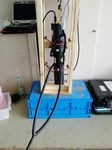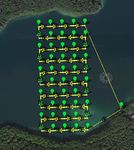Neuglobsow Campaign 17.8 20.8.2020 - Our MOSES permafrost thaw Neuglobsow campaign took place @ Stechlinsee, IGB with 23 C water temperatures! ...
←
→
Page content transcription
If your browser does not render page correctly, please read the page content below
Neuglobsow Campaign
17.8. – 20.8.2020
Our MOSES permafrost thaw Neuglobsow campaign took place @ Stechlinsee, IGB with 23°C
water temperatures!
Fig.1 Participants: (back from the left) Bill Cable (AWI), Ingeborg Bussmann (AWI), Falk Brethauer
(GFZ), Trond Ryberg (GFZ), Bennet Juhls (AWI), Georgiy Kirillin (IGB), Christof Lendl (GFZ), Anton
Küch (AWI), Christian Rasmussen (AWI), Frederieke Miesner (AWI), (front from the left) Christof
Engelhardt (IGB), Julia Boike (AWI), Paul Overduin (AWI), Christian Haberland (GFZ) and Antje
Eulenburg (AWI). Not pictured, but in attendance: Katrin Kohnert (IGB), Lion Fritzsche (THB).
Included were 16 participants from three research institutes and one university: AWI Potsdam,
AWI Helgoland, GFZ, IGB and THB. We tested some of the instruments that are being
developed as part of the MOSES project for use in icy Arctic waters in regions affected by rapid
permafrost thaw:
a semi-autonomous boat with ambient noise sensor, CTD and methane/gas analyzer (DGES
and MGGA), an autonomous bathymetry boat, an echo sounder boat, sediment sampler,
temperature lance, thermal conductivity probes, seismic sensor, spectral absorption and
attenuation sensor.
The Stechlinsee is a proglacial lake in Brandenburg, Germany, famous for its excellent water
quality and transparency. The lake is about 4.52 km² in size and up to 69.5m deep. It is home
to the Leibniz Institute of Freshwater Ecology and Inland Fisheries and the LakeLab, a large
experimental setup to study the effects of global environmental change on lakes. Below is a
summary of the measurement platforms and instruments that we were able to test during the
Neuglobsow campaign.
1Fig. 2: PlanetScope Satellite image (5m spatial resolution) of the Stechlinsee acquired on August 17,
2020. The shallow water zones close to the lake shore are visible (bright areas).
SWOPpy (GFZ)
SWOPpy (Shallow Water Observation Platform) is a semi-automated boat/platform for shallow
water analysis (to be used in shelf regions, lakes and rivers) powered by an electric motor. It
can sequentially visit a predefined set of points on the water and stay at these locations for a
defined time in order to perform various kinds of measurements. An automated winch can be
used to lower a sensor platform down to the bottom of the water body (max. depth: ~80 m).
For mapping of the top of the ice-bonded permafrost table in the MOSES context, the sensor
platform is equipped with a broadband seismic sensor. Additional mounted sensors include
echo sounder (water depth), GPS (position, time), tilt meter (inclination of the sensor platform)
and a CTD (temperature, electrical conductivity, sound velocity), however, other sensors can
be attached (e.g. gas analyzer etc.).
2Fig. 3: Top: SWOPpy on Lake Stechlin. Lower Left: Detail of the sensor platform, winch and rig;
Lower Right: Measurement points on Stechlinsee 18./19.08.2020 [Photos by Ch. Rasmussen, AWI]
Fig. 4: The two yellow cases in this photo are the Dissolved Gas Extraction System (DGES, bottom)
and Microportable Greenhouse Gas Analyzer (MGGA) from Los Gatos Research. In combination, these
instruments extract CO2 and Methane from water (DGES) and determine their concentration (MGGA).
Here they are installed on SWOPpy, enabling automated measurements of Methane and CO 2 in the
surface waters of the lake. [Photo by Anton Kuech]
3Fig. 5: Bill Cable Cleans the mirrors in a different Los Gatos Greenhouse Gas Analyzer that needed
some maintenance. [Photo by Antje Eulenberg]
Temperature Lance
Fig. 6: Top left: Temperature lance extension and cable visible from the water surface; top right:
Temperature lance and extensions; bottom left: temperature lance being inserted in the lakebed; bottom
right: temperature lance measurement and control logger.
4The temperature lance is a custom-built (AWI) 1.5 m stainless steel probe with 30 digital
temperature sensors and 2 accelerometers used to measure the temperature profile of lake
sediments. With six 1.5 m extensions, measurements can be made in water depths of up to 9
meters. The data is recorded automatically at a specified interval along with GPS position and
time.
BathyBoat
An important part of the puzzle for permafrost thaw is how ice in the ground changes the shape
of the landscape – and of the “waterscape”, the bathymetry of thaw lakes and coastal
regions. For this reason, we want to measure changes to the shape of the land, lake beds and
the sea floor. This is done using a combination of methods in the MOSES project. On land
we use subsidence stations (vertical position at a point), laser scanning from towers and
aircraft, and passive GPS interferometry. Underwater, we use echosounders and CTD sensors
to measure water depths. The “BathyBoat” is a drone boat made by SimpleUnmanned that
can be either controlled manually or programmed for a fully autonomous mission. It carries a
sonar sensor to measure water depth (Bathymetry) from 0.4 to 200 meters with a resolution of
1 cm and has a separate GNSS collecting raw data, which can be post processed to improve
the position accuracy to approximately 10 cm.
Fig. 7: Left: Manual remote control, computer interface and BathyBoat in the background; Middle:
Measurement points and route on Stechlinsee; Right: BathyBoat. [Photos: Bill Cable]
Spectral Absorption and Attenuation Sensor (ac-s), Sea-Bird Scientific
The ac-s device allows measurement of absorption and attenuation spectra of a single water
sampler source using two separate and simultaneous optical pathways. By filtering water
samples entering the ac-s, absorption and attenuation spectra for dissolved material may be
measured; without filtration, the spectra for bulk water including particles are measured.
The instrument can be used in two different setups: 1) in a flow-through mode, where a pump
ensures a steady flow of water through the optical pathways (Fig. ac-s1. 2) As a lab-instrument,
where distinct water samples can be measured (Fig. ac-s2).
5Fig. 8: Underway flow-through setup onboard a boat travelling with low speed.
Fig. 9: Lab setup for analysis of distinct water samples.
The absorption and attenuation of the water can be used to quantify water constituents by their
optical properties. The absorption and attenuation properties measured in situ can be used to
validate optical satellites.
6You can also read



























































